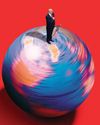
Pity the Bud Light marketing staffers who hired Dylan Mulvaney. This spring, the brand sent the transgender influencer a can of beer with her face on it for a jokey 60-second Instagram video promoting a March Madness giveaway. Cue the culture-war panic: a strikingly effective right-wing boycott, followed by anger at the brand’s response from the LGBTQ community. Nearly $400 million in sales-and Bud Light's 22-year supremacy as the bestselling U.S. beer-vanished in weeks.
It was one of the more public, and painful, recent implosions of socially conscious branding, but it's far from the only one.
Just in recent months, the Bud Light boycott has shared headlines with similar customer backlash against Target and Kohl's for selling LGBTQ Pride-related merchandise; ongoing skirmishes between Disney and Gov. Ron DeSantis over the company's tortured opposition to Florida's "Don't Say Gay" legislation; and a fast-growing wave of legal challenges to companies and investors over their diversity, equity, and inclusion policies.
With the 2024 elections just a year away, "it's going to get harder before it gets easier," warns Tom Lyon, an economics professor who runs a sustainability-focused program at the University of Michigan's Ross School of Business.
AB InBev's seemingly innocuous Bud Light marketing ploy ended up breaking the unspoken first commandment of corporate gospel in this awkward, politically divided era: Thou shalt embrace social and environmental causes-especially if doing so helps sell more stuff-but that embrace shalt absolutely not cost the company money.
Bu hikaye Fortune US dergisinin October - November 2023 sayısından alınmıştır.
Start your 7-day Magzter GOLD free trial to access thousands of curated premium stories, and 9,000+ magazines and newspapers.
Already a subscriber ? Giriş Yap
Bu hikaye Fortune US dergisinin October - November 2023 sayısından alınmıştır.
Start your 7-day Magzter GOLD free trial to access thousands of curated premium stories, and 9,000+ magazines and newspapers.
Already a subscriber? Giriş Yap

THE NEW GOLD RUSH
Gold prices have soared amid global uncertainty and a central-bank-driven buying spree. But this time, the gold mining industry looks very different.

A New Season for Giving
As the PGA TOUR kicks off its 2025 season alongside its sponsors in Hawai'i, the organization is continuing to make an impact in local communities.

WELCOME TO ELONTOWN, USA
The small town of Bastrop, Texas (pop. 12,000), has become a home base for Elon Musk's business empire. What comes next is anyone's guess.

100 MOST POWERFUL PEOPLE
Our inaugural, authoritative ranking of the leaders whose innovation and impact have elevated them to the top of the business world.

ARE CEO SABBATICALS THE ULTIMATE POWER MOVE?
WHEN VENTURE capitalist Jeremy Liew and his wife were dating, they talked about how one day they would take a year to travel the world. \"That's how we'd know we'd made it,\" Liew says.

WHAT ARE THE BEST METRICS FOR MEASURING A STARTUP'S POTENTIAL?
IN HIS 2012 ESSAY \"Startup = Growth,\" Paul Graham talks about a 5% to 7% weekly growth rate as table stakes for startup success. If you're growing 10%, he says, you're doing \"exceptionally well.\"

TECH POLYMARKET'S ELECTION ACCURACY MADE SHAYNE COPLAN A STAR-BUT AN FBI RAID POINTS TO TROUBLE AHEAD
IN NOVEMBER, Shayne Coplan had a week he'll remember for the rest of his life: He got a phone call from the highest echelons at Mar-a-Lago. He went on TV for the first time. And his New York City apartment was raided by the FBI.

WHY BIG TECH IS THE NUCLEAR INDUSTRY'S NEW BEST FRIEND
OVER THE PAST several years, Big Tech firms like Google and Microsoft have trumpeted ambitious plans to go carbon-neutral, or even carbon-negative, by 2030. But then the generative-AI boom came along and threw a giant wrench in their plans.

WHAT PALMER LUCKEY, THE MAN REVOLUTIONIZING WARFARE, IS AFRAID OF
PALMER LUCKEY, the founder of the $14 billion Al-powered weapons startup Anduril, has become the face of change in the defense industry.

GLOBAL BUSINESS BRACES FOR TRUMP 2.0
AROUND THE WORLD in 2024, voters chose change: in South Africa, France, Britain, and Japan. But nowhere does the anti-incumbent trend matter more than in the United States.